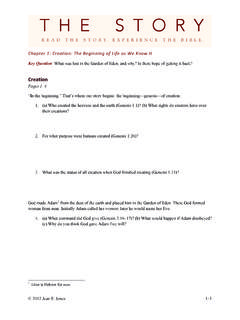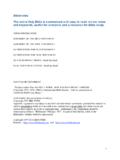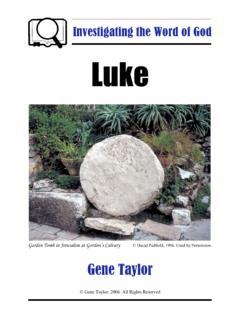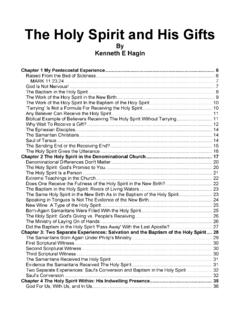Transcription of Chapter 15: God’s Messengers - Jean E. Jones
1 2012 Jean E. Jones 15 1 Chapter 15: God s Messengers Key Question: How can we listen to God better? Elijah on Mount Carmel Pages 203 206 A little over fifty years after the northern tribes split from Judah, Ahab became king of Israel. Influenced by his wife Jezebel, he made Baal worship the national religion. God sent prophets to call his people back to him, but Jezebel killed as many as she could find. It seemed Baal was stronger than the Israelite God, Yahweh. The people wavered: Who was the real God? God answered that question through the prophet Elijah. 1. (a) What did Elijah tell King Ahab in 1 Kings 17:1? (b) The Canaanites believed Baal1 was a storm god who controlled rain, gave life through rain, spoke through thunder, and used lightening as a weapon. What was Elijah s message designed to prove?
2 After three years of drought drove home the point, God sent Elijah to Ahab. Elijah, Ahab, 450 Baal prophets, 400 Asherah prophets, and onlookers gathered on Mount Carmel. 2. (a) What did Elijah ask the people (1 Kings 18:21)? (b) Considering the people s beliefs about Baal, why do you think Elijah proposed calling for an answer by fire (18:23 24)? 1 Baal means lord. 2012 Jean E. Jones 15 2 From morning to evening the Baal prophets called for their god to answer, to no avail. Finally, Elijah stepped forward. It was time to call on the God who had named their forefather Israel, the very name by which they now called (a) What was this contest designed to let the people know (1 Kings 18:36 37)? (b) What happened when Elijah prayed (18:38)?
3 (c) How did the people respond (18:39)? (d) What long-lasting results should this have brought in Israel? God acted miraculously so the people would know he was the one true God. Miracles are temporary suspensions of the laws of nature designed to prove that God is God and to confirm Messengers and messages as being sent from him. The miraculous birth of Isaac to the barren elderly Sarah confirmed God s promise that he was building a nation through Isaac. The miraculous deliverance from Egypt through Moses proved that God called the Israelites, gave the covenant, and sanctioned Moses as leader and prophet. And now, the miraculous fire from heaven proved the Lord God was God and he was the provider of rain, not Baal. 4. We communicate with God through prayer. Compare the Baal prophets prayers in 1 Kings 18:26 29 with Elijah s prayer in 1 Kings 18:36 37.
4 What can we learn about prayer from these passages? 2 1 Kings 18:31. 2012 Jean E. Jones 15 3 Elijah on Mount Horeb Pages 206 209 The contest on Mt. Carmel showed decisively that the Lord is God. But Jezebel didn t buy it: When King Ahab told her what happened, she sent a message to Elijah that she planned to kill him. Frightened, Elijah fled south. Leaving his servant in Judah, he continued alone into the wilderness beyond. There, convinced that the events on Mt. Carmel had failed to turn Israel back to God, he asked God to let him die. 5. (a) How did God provide for the exhausted and discouraged prophet s needs (1 Kings 19:5 8)? (b) What can we learn about God s character from this? Elijah traveled to Mt. Horeb, the place where God had called to Moses from the burning bush,3 established his covenant with the Israelites,4 and passed by Moses to show him his (a) What reason did Elijah give for going to Mt.
5 Horeb (1 Kings 19:9 10)? (b) What other reasons might Elijah have had? The Lord told Elijah he was about to pass by. 7. (a) In what phenomena did Elijah not find the Lord (19:11 12)? (b) Elijah may have thought that the Israelites rejection of God s covenant would bring immediate destruction through one of these phenomena, but that was not so. What form did God take to reveal himself to Elijah (19:12 13)? (c) What can we learn from this? 3 Exodus 3:1 4. 4 Exodus 17:5; 19:1 3; 20:18 19; Deuteronomy 5:2; 18:16. Mount Sinai is probably another name for Mount Horeb. 5 Exodus 33:18 23; 34:5 7. 2012 Jean E. Jones 15 4 Elijah may have felt like a failure with no purpose for living, but God assured him otherwise. He sent Elijah back to continue his work, but not alone.
6 He told Elijah to anoint a successor, Elisha, who would travel with him and serve him. He assured Elijah that Israel had 7,000 other faithful followers. Other prophets came out of hiding and Elijah mentored them. Elijah was no longer alone: He had fellowship and support. God met his every need. God continued reaching out to Israel through more Messengers . Jehoshaphat king of Judah encouraged Ahab to follow God, to ignore the false prophets who only told him whatever he wanted to hear, and to respect God s true After Ahab died, Jehoshaphat sent Levites into Israel to teach Pages 209 213 Elisha eventually inherited Elijah s ministry, and God did miracles through him We re God s Messengers when we tell others about what God has done, even when it s not miraculous. Briefly describe something God has done for you.
7 Ordinary people spread the word throughout Israel, Judah, and other nations. Sometimes God grants special glimpses into the spiritual realm. That s what he did for Elisha s scared servant when an Aramean army approached. 9. (a) What did Elisha tell his servant (2 Kings 6:15 16)? (b) After Elisha prayed for his servant s eyes to be opened, what did the servant see (6:17)? (c) What can we learn about the spiritual realm from this? 6 2 Chronicles 18:5 7. 7 2 Chronicles 17:7 9; 19:4. 8 Elisha s request for a double portion of Elijah s spirit in 2 Kings 2:9 was a request for the inheritance rights of the firstborn. 2012 Jean E. Jones 15 5 Amos Pages 213 215 Kings and prophets came and went. About forty years after Elisha s death, Amos prophesied in Israel.
8 A wealthy class now lived in luxury and pleasure seeking, but ignored God s laws to protect the needy. They oppressed the poor and sold them into slavery over paltry debts. The courts denied justice to the weak. Cheating, lying, drunkenness, and immorality abounded. Leaders silenced God s prophets and forced godly people to break vows. Idolatry was (a) According to Amos 3:1 2, why would God punish Israel s sins? (b) What does God s decision to punish the unrepentant tell us about his care for the oppressed? (c) What does it tell us about God s justice? 11. (a) When the people refused to listen to the Provider of all good things, how did he communicate they were heading for danger (Amos 4:6 and 4:10)? (b) The New Testament tells Christians to endure hardship as discipline; God is treating you as sons.
9 For what son is not disciplined by his father? 10 What does this tell us about how God uses hardship? A prophet s life was hard, for few people like being told their actions are wrong. A priest accused Amos of conspiring against the king and ordered him to get (a) According to Amos 5:6 and 5:14 15, what could the people do to avert disaster? (b) What does this tell us about the purpose behind godly exhortation? (c) Who was doing what was truly best for the people: Amos with his unwelcome message, or the priest who ordered him to stop prophesying? Why? 9 Amos 2:6 12; 4:1; 5:7; 5:10 12; 6:4 6; 8:4 6. 10 Hebrews 12:7. 11 Amos 7:10 13. 2012 Jean E. Jones 15 6 Hosea Pages 215 217 After Amos, God sent Hosea to Conditions had worsened. Political assassinations divided the nation.
10 Worse, the Israelites were sacrificing children to Canaanite gods. 1313. (a) In Hosea 4:1, what did Hosea say the people lacked? (b) What did they have instead (4:2)? (c) Hosea said people were mourning and wasting away because of this (4:3). Describe how you imagine it was like to live in Israel then. (d) What does God s concern about these things tell us about him? Israel as a nation no longer served her purpose, and her oppression of the helpless had to be stopped. 14. What was inevitable now for the northern kingdom of Israel (Hosea 9:7)? Israel s people could not stay in the land; they were going to By this God would heal their waywardness15 so one day, the Israelites might seek God and again be under David their We ve seen God speak to people through dramatic miracles, gentle whispers, loving provision, godly teachers, inspired Scripture, everyday people, spiritual glimpses, caring discipline, and stern exhortations.







